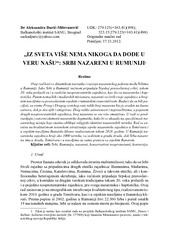| dc.creator | Đurić Milovanović, Aleksandra | |
| dc.date.accessioned | 2020-04-20T11:29:01Z | |
| dc.date.available | 2020-04-20T11:29:01Z | |
| dc.date.issued | 2012 | |
| dc.identifier.issn | 1821-3545 | |
| dc.identifier.uri | https://dais.sanu.ac.rs/123456789/8162 | |
| dc.description.abstract | Ovaj rad bavi se dinamikom nastanka i razvoja nazarenskog pokreta među Srbima u Rumuniji. Iako Srbi u Rumuniji većinom pripadaju Srpskoj pravoslavnoj crkvi, tokom 20. veka prelazili su i u različite neoprotestantske zajednice, kao što su nazarenska i bap tistička. Putem nemačkih i mađarskih misionara, nazareni su širili svoje zajednice u broj nim naseljima sa pravoslavnim srpskim i rumunskim stanovništvom. Budući da su bili pa cifisti, za vreme Prvog i Drugog svetskog rata veliki broj nazarena bio je osuđen na kazne zatvora, dok je deo njih i emigrirao. Zbog velike zatvorenosti i neprozelitizma, a pojavom drugih neoprotestantskih zajednica, broj nazarena se sve više smanjivao. U radi se pred stavljaju i osnovni elementi nazarenske dogmatike, kako bi se ukazalo na specifičnosti na zarenskog učenja koje snažno oblikuje religijski identitet nazarenskih vernika. Rad se za sniva na kvalitativnom terenskom istraživanju srpske nazarenske zajednice u Temišvaru i u srpskim naseljima Banatske klisure realizovanom tokom 2010. godine. U Rumuniji na zarenska zajednica broji oko 1000 vernika, sa sedištem u gradu Aradu, dok Srba nazare na ima u Aradu, Temišvaru i u naseljima uz samu granicu sa srpskim Banatom. | sr |
| dc.description.abstract | „FROM THE WORLD NOBODY COMES TO OUR FAITH ANYMORE“: NAZARENE SERBS IN ROMANIA
Abstract
This paper deals with the origin and dynamics of development of Nazare- ne movement among Serbs in Romania. Although the majority of Serbs in Roma- nia belong to the Serbian Orthodox Church (Eparchy of Timisoara) during 20th century a number of neo-Protestant communities appeared, such are Nazarenes or Baptists. Living in ethnically and religiously heterogeneous areas, the Serbs in Romania came into more direct contact with German and Hungarian missiona- ries who began to spread Nazarene teachings in the mid-nineteenth century. Sin- ce they were pacifists, during the First and Second World War a number of Na- zarenes was imprisoned or they emigrated abroad. Due to the closeness of the- ir community and the appearance of other neo-Protestant communities the num- ber of Nazarenes decreased significantly. In order to outline specificity of the Na- zarene teachings which strongly shape religious identity of Nazarene believers, in the paper some basic elements of Nazarene dogma are presented. The paper is based on the qualitative-oriented field research conducted during 2010 in Timiso- ara and Serbian settlements in the Banat gorge. In Romania, the Nazarene com- munity numbers about 1,000 believers, based in the city of Arad, while Nazarene Serbs are present in Arad, Timisoara and the border area with the Serbian Banat. | en |
| dc.language.iso | sr | sr |
| dc.publisher | Novi Sad : Filozofski fakultet u Novom Sadu | sr |
| dc.relation | info:eu-repo/grantAgreement/MESTD/Basic Research (BR or ON)/177006/RS// | sr |
| dc.rights | openAccess | sr |
| dc.rights.uri | https://creativecommons.org/licenses/by-nc/4.0/ | |
| dc.source | Religija i tolerancija | sr |
| dc.subject | Srbi | sr |
| dc.subject | Rumunija | sr |
| dc.subject | Nazareni | sr |
| dc.subject | konverzija | sr |
| dc.title | "Iz sveta više nema nikoga da dođe u veru našu": Srbi nazareni u Rumuniji | sr |
| dc.type | article | sr |
| dc.rights.license | BY-NC | sr |
| dc.citation.spage | 299 | |
| dc.citation.epage | 316 | |
| dc.citation.volume | 10 | |
| dc.citation.issue | 18 | |
| dc.type.version | publishedVersion | sr |
| dc.identifier.fulltext | https://dais.sanu.ac.rs/bitstream/id/31529/bitstream_31529.pdf | |
| dc.identifier.rcub | https://hdl.handle.net/21.15107/rcub_dais_8162 | |

